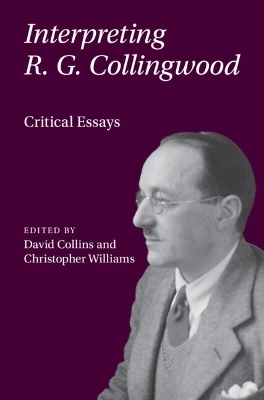
Interpreting R. G. Collingwood
Cambridge University Press (Verlag)
978-1-009-33705-2 (ISBN)
An indisputably prominent figure in twentieth-century philosophy, R. G. Collingwood often remains elusive even to those who admire his achievements. This volume of new essays aims to reintroduce Collingwood to twenty-first-century philosophical readers and to show why, and how, his achievements matter. Each essay offers an original contribution to the understanding of some aspect of Collingwood's thought, including new interpretations of several of his central ideas, re-examinations of his place in twentieth-century philosophy, and an extended consideration of a previously undiscussed manuscript. The essays span the wide range of Collingwood's interests, including metaphysics, epistemology, logic, philosophy of mind, aesthetics, and political philosophy, as well as Roman British history and the history of art. Emphasis is placed on Collingwood's connections to traditions with which his name is not typically linked, including pragmatism, analytic philosophy, and phenomenology. This rich volume will stimulate further examination of Collingwood and his legacy.
David Collins is Rubinoff Early Career Research Fellow at Churchill College, Cambridge. He has co-edited The Moral Psychology of Trust (2023) and Perspectives on Trust in the History of Philosophy (2023). Christopher Williams is Associate Professor of Philosophy at the University of Nevada, Reno. He is the author of A Cultivated Reason: An Essay on Hume and Humeanism (1999) and has co-edited Passions and Persons: Essays in Honor of Annette Baier (2005).
List of figures; List of contributors; Acknowledgements; List of abbreviations; Introduction David Collins and Christopher Williams; Part I. Situating Collingwood: Beyond Idealism; 1. Collingwood and logical positivism Rex Martin; 2. On Collingwood's criticism of analytic philosophy Paolo Camporese; 3. Collingwood and the new pragmatists on socially situated knowledge Elena Popa; 4. Collingwood and Wittgenstein on the relation between philosophy and poetry Vasso Kindi; 5. Collingwood and phenomenology: intentionality, expression, and responsibility Donald A. Landes; 6. Revisiting Gadamer's critique of Collingwood Mathieu Marion; Part II. Issues in Collingwood's Philosophy; 7. Collingwood's logic of question and answer: connecting the dots Fernando Leal; 8. Presuppositional analysis and the goal of metaphysical inquiry Giuseppina D'Oro; 9. Is Collingwood a process philosopher? The Libellus de Generatione's Ontology of Becoming David Collins; 10. Collingwood on imagination Christopher Williams; 11. Collingwood on 'painting imaginatively' and the expressive nature of the artwork David Davies; 12. Collingwood's influence on Baxandall: abductive reasoning and the triangle of re-enactment Chinatsu Kobayashi; 13. 'Reconsidering questions of principle': Collingwood and the revival of Celtic art Stephen Leach; 14. What is living and what is dead in Collingwood's New Leviathan? Sabina Lovibond; Bibliography; Index.
| Erscheinungsdatum | 26.11.2024 |
|---|---|
| Zusatzinfo | Worked examples or Exercises |
| Verlagsort | Cambridge |
| Sprache | englisch |
| Themenwelt | Kunst / Musik / Theater ► Kunstgeschichte / Kunststile |
| Geschichte ► Allgemeine Geschichte ► Neuzeit (bis 1918) | |
| Geisteswissenschaften ► Philosophie ► Erkenntnistheorie / Wissenschaftstheorie | |
| ISBN-10 | 1-009-33705-X / 100933705X |
| ISBN-13 | 978-1-009-33705-2 / 9781009337052 |
| Zustand | Neuware |
| Informationen gemäß Produktsicherheitsverordnung (GPSR) | |
| Haben Sie eine Frage zum Produkt? |
aus dem Bereich


